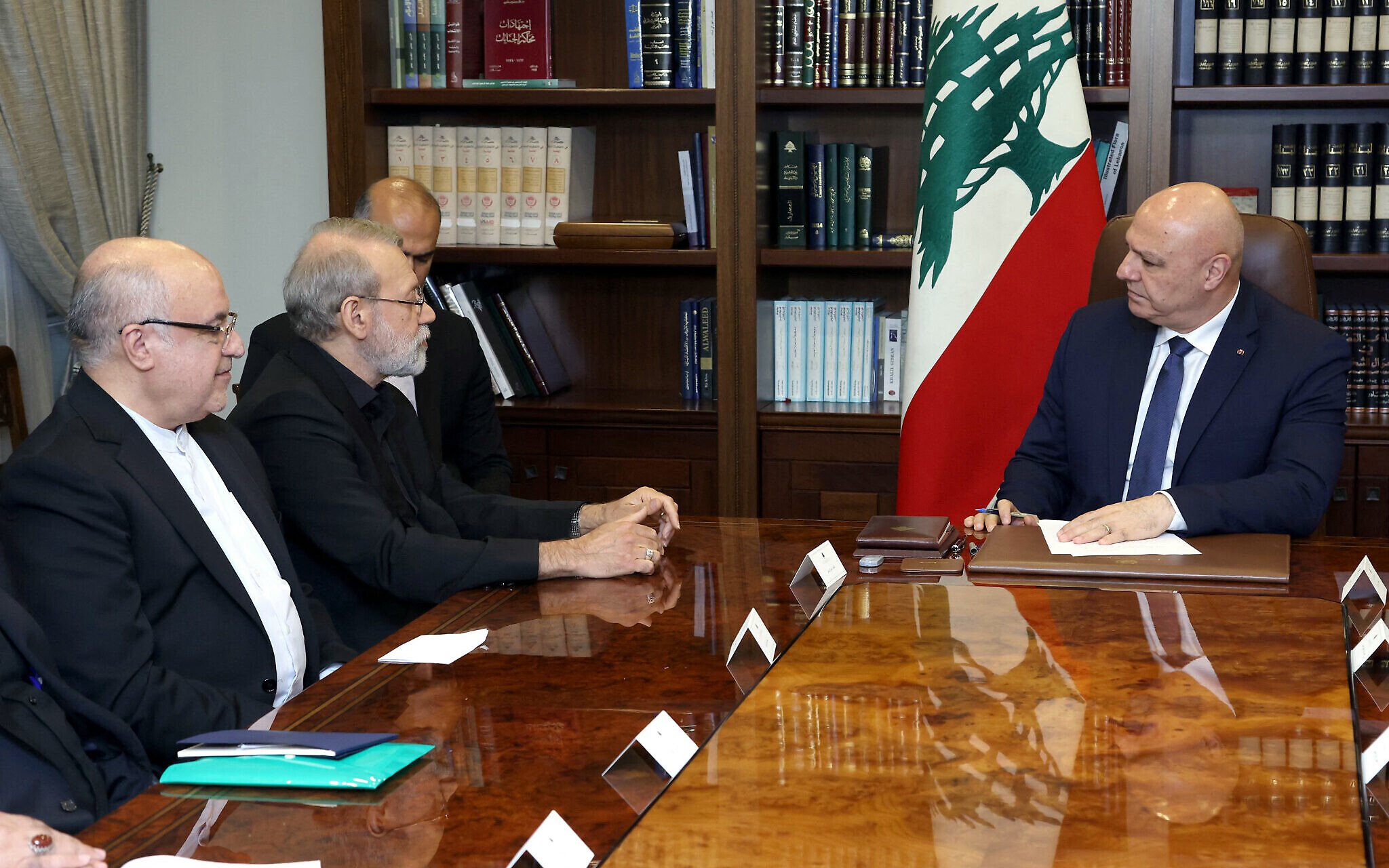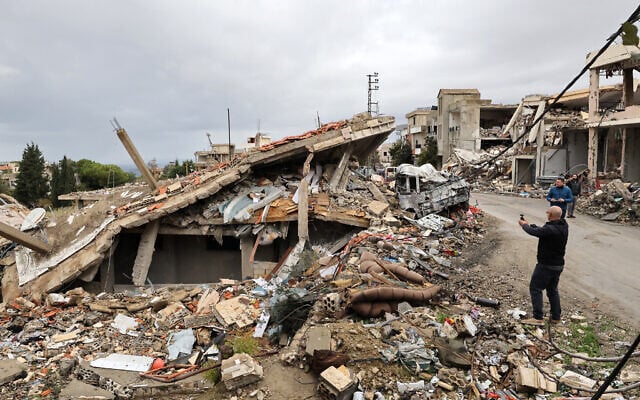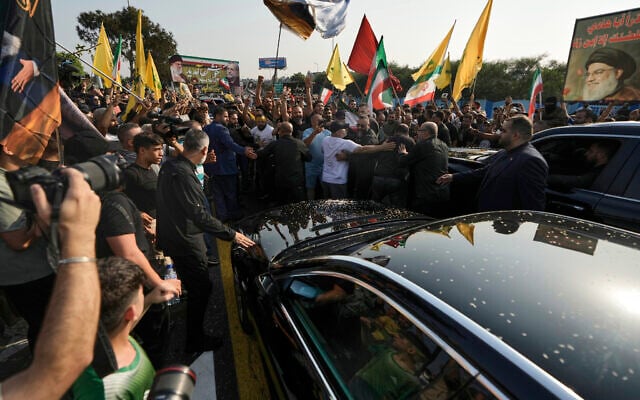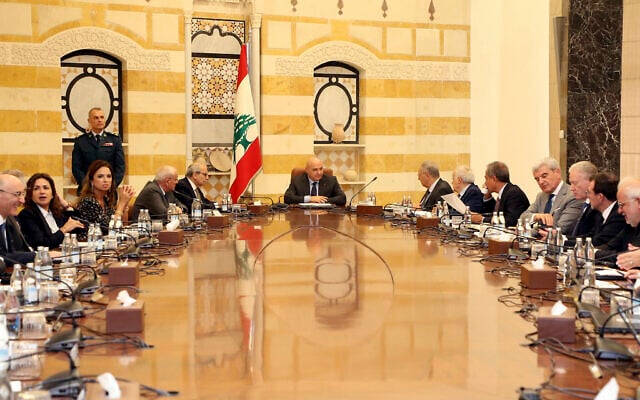



No group in Lebanon is permitted to bear arms or rely on foreign backing, Lebanon’s President Joseph Aoun told a senior Iranian official on Wednesday, days after the Lebanese cabinet approved the objectives of a US-backed roadmap to disarm the Iran-aligned Hezbollah terror group in line with a 2006 UN Security Council resolution.
During a meeting in Beirut with Ali Larijani, secretary of Iran’s top security body, Aoun warned against foreign interference in Lebanon’s internal affairs, saying the country was open to cooperation with Iran but only within the bounds of national sovereignty and mutual respect.
Following his arrival in Beirut, Larijani vowed that his government would continue to provide support after it expressed opposition to the disarmament plan.
“We reject any interference in our internal affairs,” Aoun said, adding that “it is forbidden for anyone… to bear arms and to use foreign backing as leverage,” according to a statement from the Lebanese presidency posted on X.
“The friendship we seek with Iran must be with all Lebanese, not through one sect or component alone,” Aoun said, according to the statement.
He added that recent language used by some Iranian officials had not been helpful, and reaffirmed that the Lebanese state and its armed forces were solely responsible for safeguarding all citizens.
Iran and its so-called “axis of resistance” have suffered a series of blows in their long-running quest to eliminate Israel after Hamas sparked the ongoing war with Gaza with its October 7, 2023, massacre in southern communities.
Hezbollah suffered devastating losses to its infrastructure and leadership after launching cross-border attacks on Israel — a day after the Hamas-led invasion — which sparked a year of hostilities that ended with a November 2024 ceasefire.
A month later, Syria’s president Bashar al-Assad was ousted, depriving Hezbollah of its main conduit for weapons and supplies from Iran.
Israel launched airstrikes against Iran in June, targeting its nuclear and ballistic missile facilities, with the United States stepping in briefly to bomb Iranian underground nuclear facilities.
Iran has declared its firm opposition to the Lebanese government’s bid to disarm Hezbollah, while the movement itself has slammed the decision as a “grave sin.”
Before the war with Israel, Hezbollah was believed to be better armed than the Lebanese military. It built its popularity, in part, on resistance to Israel, which occupied southern Lebanon for nearly two decades until 2000.
It long maintained it had to keep its arsenal in order to defend Lebanon from attack, but critics accused it of using its weapons for political leverage. Moreover, UN Security Council Resolution 1701 that ended an Israel-Hezbollah war in 2006 mandated that the terror group have no presence near the Israel border and be completely disarmed, clauses that were never implemented.
In Beirut, Larijani vowed continued support.
“If… the Lebanese people are suffering, we in Iran will also feel this pain and we will stand by the dear people of Lebanon in all circumstances,” Larijani told reporters.
Dozens of Hezbollah supporters gathered along the airport road to welcome Larijani. He briefly stepped out of his car to greet them as they chanted slogans of support.
In addition to President Aoun and Prime Minister Nawaf Salam, Larijani was due to meet parliament speaker Nabih Berri, who is close to Hezbollah.
Hezbollah’s grip on power has slipped since the ceasefire with Israel, and the new Lebanese government, backed by the United States, has moved to further restrain it.
The Lebanese government on Thursday voted to approve a US proposal that would ultimately lead to disarming the Hezbollah terror group, after tasking the army earlier in the week with drawing up a plan to establish a state monopoly on arms by the end of the year, a challenge to Hezbollah.
The decision to disarm the group prompted Hezbollah ministers and Muslim Shiite allies to walk out of the cabinet’s discussion on the plan, three Lebanese political sources told Reuters.
Submitted by US President Donald Trump’s envoy to the region, Tom Barrack, the plan sets out the most detailed steps yet for disarming the Iran-backed group, which has rejected mounting calls to disarm since last year’s devastating war with Israel.
In addition to disarming Hezbollah, the US proposal would also lead to ending Israel’s military operations in the country and the withdrawal of its troops from five positions in southern Lebanon.
The US’s disarmament proposal aims to “extend and stabilize” the ceasefire agreement between Lebanon and Israel.
Israel — which routinely carries out airstrikes in Lebanon despite the ceasefire, saying it is responding to violations of the agreement and that the truce’s terms allow it to do so — has already signaled it would not hesitate to launch military operations if Beirut failed to disarm the group.
Iran’s “axis of resistance” is a network of terror groups in the region, including Hamas in Gaza and Yemen’s Houthis, united in their commitment to the destruction of Israel.



